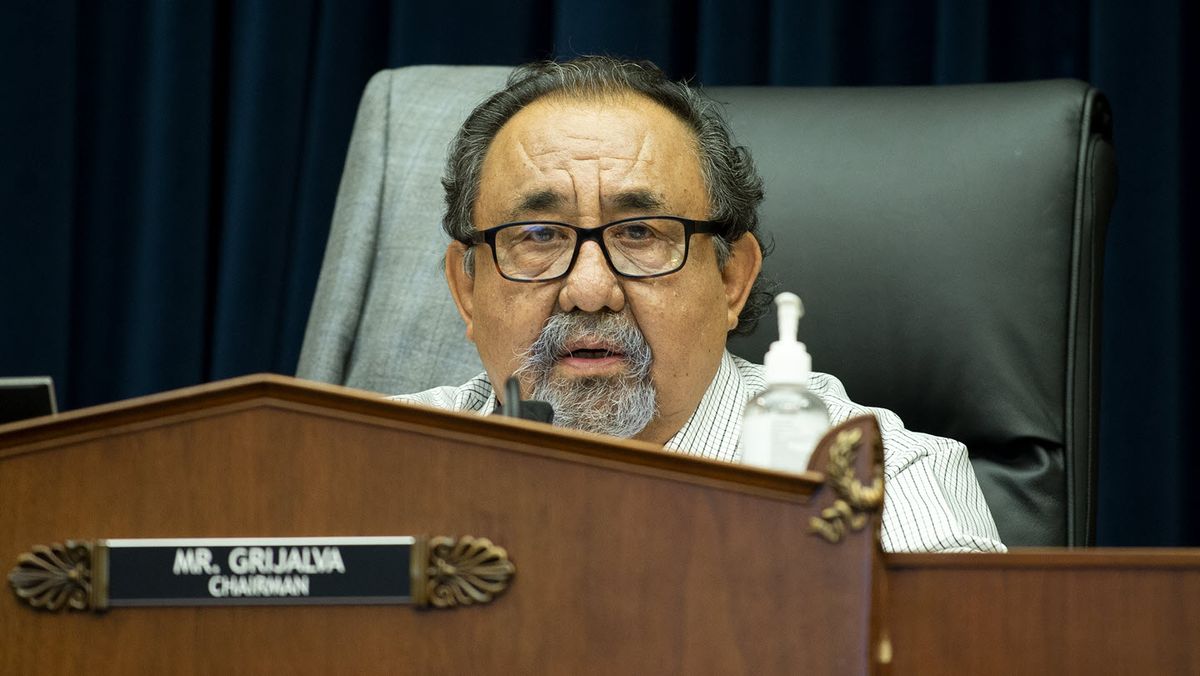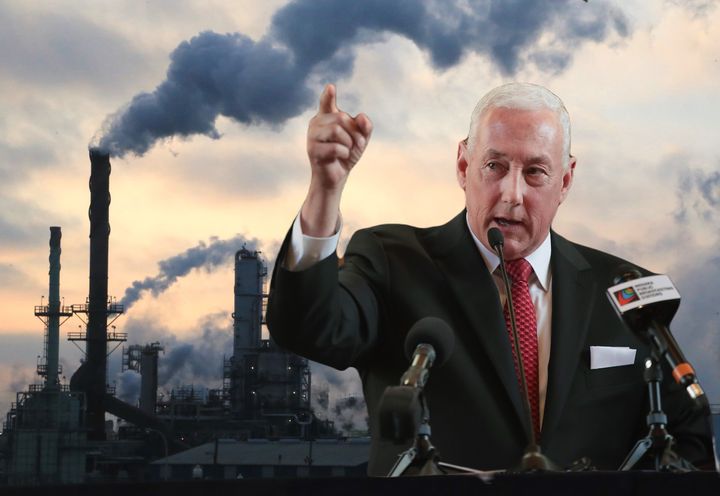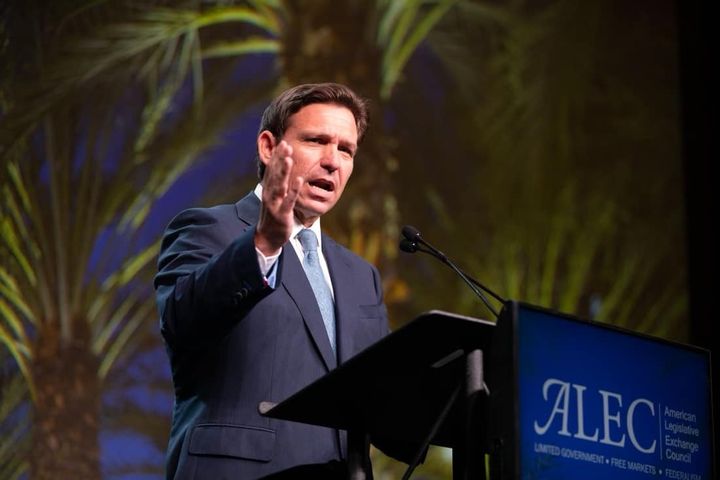Congressional Leader Lays Down Marker in Revolving-Door Battle
Rep. Raúl Grijalva has built a coalition of outside groups committed to barring corporate insiders from executive branch positions. Now he wants House members to sign on.

The American Prospect is a nonprofit, independent magazine covering public policy and politics. Sludge is re-publishing this article.
A simmering battle over corporate capture in the Democratic Party burst into the open today. Progressive organizations and a committee chair are teaming up to force House Democrats, nearly all of them up for re-election, to take a stand on whether they will hold a potential Joe Biden administration to at least the same anti-corruption standard that Barack Obama held for himself as president.
Rep. Raúl Grijalva (D-Ariz.), the former chair of the Congressional Progressive Caucus, has issued a “Dear Colleague” asking for partners to sign on to a letter, provided to the Prospect, to be given to Senate Democratic Leader Chuck Schumer and Republican Leader Mitch McConnell. The letter urges Senate leaders to “oppose Senate confirmation of any nominee to an executive branch position who is currently or has been a lobbyist for any corporate client or officer for a private corporation, in this or any future administration.”
That would include all Cabinet officials, and any of the roughly 1,200 Senate-confirmed positions throughout the federal government. The letter, endorsed by Demand Progress, the American Economic Liberties Project, the Revolving Door Project, and the Sunrise Movement, represents a baseline request for personnel in the next administration. Groups had proposed something similar to this for months, but not this sweeping a ban, and not with the full-throated support of a House committee chair.
With the pandemic, racial justice, voting rights, and seemingly a thousand other daily issues tearing through the presidential campaign, anti-corruption policies, at the forefront of the past couple of elections, have taken a back seat. But the action by Grijalva, who now chairs the House Natural Resources Committee, will allow outside groups to pressure members and keep track of their position on a key question: Do they accept corporate insiders in control of critical government functions, or reject them?
The Grijalva rule is a stronger version of President Obama’s lobbyist ban. Under Obama, any registered lobbyist was barred from government service in the issue area where they lobbied until they had been unregistered for two years. On the way out, these officials couldn’t lobby the government for the remainder of the administration. Obama’s rule was a little leaky, as it didn’t apply to unregistered, de facto lobbyists who were obviously engaged in influence-peddling, lobbyists registered outside the two-year ban, or lobbyists hired for a government job outside their lobbying area.
It’s been long forgotten and is now somewhat risible, but Donald Trump also has a lobbying order in place, which replaced his predecessor’s. The Trump rule allows lobbyists into the government as long as they recuse themselves from anything they lobbied on for two years. It also allegedly bans former executive branch members from lobbying the government for five years, though it only applies to the agency where they worked.
According to one count, 281 lobbyists had worked in the Trump administration as of last October, including the secretaries of defense, interior, energy, labor, and homeland security, along with Environmental Protection Agency Administrator Andrew Wheeler. In addition, several former Trump officials found a way around the modest post-government lobbying ban.
The Grijalva rule tightens the Trump and even the Obama standard significantly. Not only is there no safe-harbor period for former lobbyists—they’re out of government no matter how long ago they lobbied—but the rule includes all officers of private corporations, of which there have been many in the past two administrations.
The letter notes that Schumer opposed corporate nominees under Trump repeatedly, from former Exxon CEO and Secretary of State Rex Tillerson, to private equity titan and Commerce Secretary Wilbur Ross, to Halliburton lobbyist and Interior Secretary David Bernhardt, to Wheeler, the former lobbyist running EPA. It cites Schumer’s own words about Trump filling the government “with industry lobbyists and rich executives.” As Grijalva concludes, if that’s a problem under a Republican administration, “there is no reason to believe that an officer or lobbyist at a major bank or financial firm should be put in charge of financial policy under a Democratic administration.”
Vice President Biden hasn’t committed even to restoring the weaker Obama-era order on lobbying, despite promising a kind of Obama restoration throughout his campaign. Numerous business types have been pitched for top slots in a Biden administration, and his transition team includes former Apple lobbyist Cynthia Hogan, Facebook director Jessica Hertz, and Jeffrey Zients, former Facebook board member and president of Cranemere, a conglomerate that buys and sells businesses. TIAA-CREF CEO Roger Ferguson and co-CEOs of Ariel Investments John Rogers and Mellody Hobson have also been mentioned as potential Cabinet-level officials.
To many in the coalition, Biden agreeing to lock up the revolving door would marry good policy with good politics.
The latter three are Black, and tensions surrounding the issue came to a head last week. Several Black Democrats made the striking claim in Politico that banning corporate lobbyists or officers from government would make it impossible for Biden to meet his diversity goals. The unsaid implication is that there exists no Black, Asian, or Latino in America qualified enough to serve in the executive branch who doesn’t also work for a corporation.
Black progressives condemned those claims on Twitter last week, including soon-to-be congressmembers Cori Bush (D-MO) and Jamaal Bowman (D-NY). “If it seems like our country’s laws and regulations are written by corporations, that’s because they are,” Bowman told the Prospect in a statement. “We need less Wall Street in the next administration and more working class representation.”
“There are untold thousands of qualified potential policymakers who demonstrably care about the public interest in federal agencies, state houses, city halls, non-profits, universities, and small businesses all across this country,” noted David Segal, executive director of Demand Progress Education Fund, one of several groups that has endorsed the Grijalva rule.
To many in the coalition, Biden agreeing to lock up the revolving door would marry good policy with good politics. Not only has corporate control prevented significant policy goals for decades, but the public knows it. Polling conducted before the 2018 midterms found that 88 percent of respondents had at least some concern that big corporations held too much power over politicians, including 83 percent of Trump voters.
The Grijalva rule would also give weight to the Biden-Harris campaign’s promises on critical issues like climate change. “Our movement has raised the bar and pushed Biden and Harris to commit to enacting the most ambitious climate action in U.S. history,” said Lauren Maunus, legislative manager of the Sunrise Movement. “But those words are just empty promises if we can’t be sure that Biden and Harris won’t be surrounded by people working on behalf of fossil fuel polluters.”
With “drain the swamp” one of the marketing slogans of Trump’s 2016 run, a message that reveals the deep rot of swamp-level corruption during Trump’s first term could be formidable. But that only holds if the Democrats offer an alternative, one that could be cemented by signing on to the Grijalva rule.
Grijalva, who has seen numerous lobbyists and corporate hangers-on pass through energy and environmental agencies while serving as ranking Democrat on the Natural Resources Committee, stresses that the character of individual would-be nominees with corporate backgrounds is not at issue.
“It is to make a statement of principle,” the letter contends. “We stand with the American people who think it’s time to stop letting the same people write important regulations, leave government service to lobby against enforcement of those regulations, then return to government service again when the right political party is in power.”
Read more from Sludge:
New Bill Seeks to Bring Lobbying Out of the Shadows
Tom Perez Put Corporate Lobbyists in Charge of the DNC’s Budget
Facebook Lobbyists Have Close Ties to Democratic Leaders
Here Are the Billionaires Funding Trump’s Voter Suppression Lawsuits
States and Cities With Public Campaign Financing Lead on Paid Sick Leave Policies




Comments ()